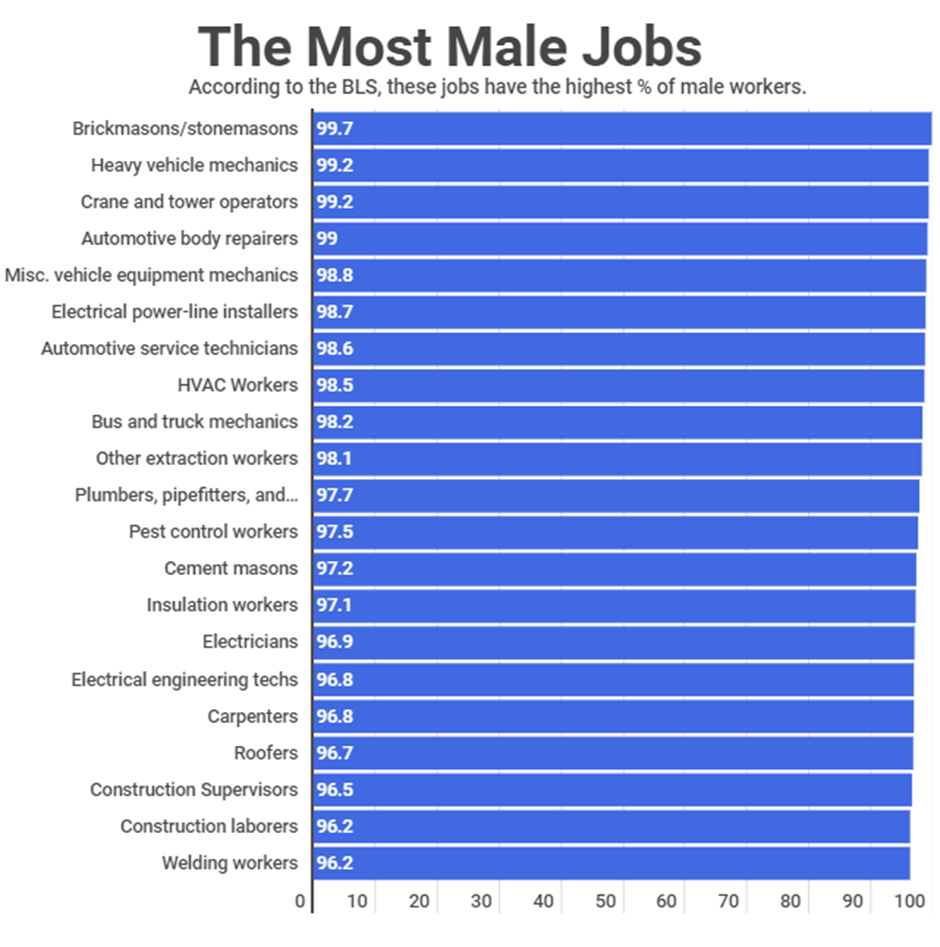I occasionally type ‘masculinity’ into Google’s news section to see what articles pop up about the subject. Typically, there are pieces on ‘toxic masculinity’ that most of the time are not worth reading. However, sometimes an article comes up that is worth looking at. One such article was recently posted on the website Areo. In it, Stewart Slater explores the problems men face in modern society and how we define masculinity.
Slater here describes one commonly cited sex difference:
“The hypothesis that men tend to be more interested in things, women in people has been proven to have a large effect size by a recent meta-analysis. It has also been observed in rhesus monkeys so may well be rooted in biology. This difference is thought to explain the gender equality paradox— whereby, as countries become freer, the sexes increasingly sort themselves into stereotypical professions. Typically male occupations such as manufacturing, which are less reliant on face-to-face contact, have been the first casualties of automatization and globalisation.”
Stewart Slater – ‘Defining Masculinity’
There is certainly evidence to support this claim: if you observe the list below which shows the types of professions which are respectively male- and female-dominated, you can easily make a ‘people-thing’ distinction.


The male-dominated professions are all manufacturing/maintenance based and many involve risk, being alone or getting your hands dirty. The female-dominated professions in contrast are all either administrative and may involve working with children or the public.
Similarly, boys and girls have been shown consistently to prefer particular kinds of toys independent of outside influences and this difference can even be observed among primates. Girls tend to prefer dolls and other ‘people-like’ toys in contrast to boys who tend to prefer ‘thing-like’ toys such as guns, trucks and trains.
There is so much evidence to show this ‘people vs things’ distinction between the sexes that it cannot be easily disregarded by sceptics of natural sex differences.
Nevertheless, I do wonder if focusing too much on this difference can be a stumbling block sometimes. While the difference is definitely valid, the context in which you describe it can determine its effectiveness.
For example, if you wanted to make a general observation about how men and women are different to someone who didn’t know any better, saying that women are interested in people and men are interested in things would be useful enough to give the ignorant person some understanding. However, if you were having a more in-depth conversation about sex differences and how they are expressed, then I think the people vs things distinction can only do so much.
A while ago, I saw a woman I follow on Twitter (I think it was Helen Pluckrose but I can’t be sure) arguing that women are more likely to study psychology because women are more people-oriented and so are more interested in the subject. Someone in the comments pointed out to her that psychology was once a male-dominated profession and it was predominantly men who pioneered the field in the first place – I sometimes wonder if the word ‘psychoanalysis’ came to be replaced by ‘psychotherapy’ during this transition from male to female!
Carole Hooven makes a similar argument in her book Testosterone about women being more likely to be teachers due to being more people-oriented which again overlooks the fact that teaching was previously a male-dominated field.
Of course, women moving into the workplace in greater numbers over the past few decades has led to many of them choosing to go into professions that they are interested in such as those that are more people-focused which has changed the sex ratio of certain professions to reflect this.
It’s not a stretch however for people to assume that women being more ‘people-orientated’ means women are better at dealing with people. We hear a lot about women apparently having superior ‘interpersonal skills’ than men but it’s rarely specified what these ‘skills’ actually are.
I concede that there will be some things in the realm of interacting with people that women will be generally better at than men, but communication is very complex so why should we assume that women are always better at it?
One implication from this idea is that any man in a ‘people-oriented’ profession like teaching will always be lacking in some way. In other words, men have nothing unique to bring to these roles as they are not as ‘skilled’ as women in them. This implication could partly explain women’s dominance in these professions.
For all women’s supposed communication skills, it’s interesting that there are a lot of jokes about women being hard to understand, at least for men. Here’s two scenes from the animated shows Monkey Dust and Family Guy parodying men’s difficulties with women.
Similarly, since men constitute roughly 50% of ‘people’, there will areas where men are better able to understand other men. I’m reminded of David Shackleton’s comment in the Canadian documentary Singing the Gender Blues: “men know they don’t understand women. Women think they understand men.”
In addition to men being presented as poorer communicators, the idea that women’s ‘people skills’ gives them an advantage in the modern world may prevent us from criticising aspects of what might be called ‘feminine communication’.
It’s been suggested by some commentators that the rise of political correctness is linked to the increase of women in public institutions (which I’ve explored myself on this blog) due to more emphasis being placed on not offending people rather than being direct and honest with others even if this directness may sometimes be upsetting. The tendency to be more easily offended is also, on average, a female trait than a male trait which can additionally make communication difficult as women may find it harder than men to work with other people they don’t get along with.
This difference may reflect another ‘broad but useful’ distinction between the sexes which is that men are direct and women are indirect. If we broadly determine male communication to be more direct and female communication more indirect, we could weigh up the pros and cons of both. In fairness, there is utility in being indirect or talking around a point which is explained in this video.
Another flaw with designating certain occupations as ‘people-orientated’ is how you distinguish these kinds of jobs from others, given that any activity that involves people could be said to be ‘people-orientated’. I get that commentators have a particular type of job in mind when they are making this claim, such as a job that involves a lot of face-to-face communication or ‘caring’ professions like nursing, but it can still be a little misleading.
For instance, is medicine a ‘people-oriented’ profession since treating people is at the heart of it? Does this mean women have a natural affinity for it? What about law? Or politics? Are men always at a disadvantage because of this? Women are in fact becoming more prominent in these professions although this is also related to education becoming more female-dominated.
Although fields like psychology are now occupied more by women than men, there are still male-dominated professions which could be said to be ‘people-oriented’. Sales is more a male-dominated domain which involves interacting with people in order to get a deal even if it is not done face to face, such as over the phone.
Business as a whole could also be considered a ‘people-orientated’ activity which was, until recently, more male-dominated. Being a leader in some form or another also requires some ‘people skills’ to get others to follow you unless violence and tyranny is used instead.
Stewart Slater’s article mostly focuses on the idea that men are struggling due to technological advances leading to a decline in jobs requiring upper body strength and an increase in jobs requiring communication. This is a common observation, but the argument that men are at a disadvantage due to these developments can itself be switched around.
Since most jobs involving technology tend to appeal more to men than to women, men could potentially have an advantage as these jobs become more advanced and commonplace. Predictably, there is a lot of concern over the fact that there are fewer women than men in the so-called ‘STEM’ fields as this article describes.
Women’s relationship with ‘things’ is also worth exploring. Women are certainly interested in people, but other female interests include clothes, beauty products, accessories like handbags, furniture, art, books etc. all of which constitute things. You might say these are all linked to people in some way, but couldn’t the same be said for male interests?
To be clear, I’m not trying to disregard the ‘people vs things’ argument entirely or the people who make it. It’s important not to fall into the trap of dismissing a sex difference for simply being broad or even ‘stereotypical’. However, there’s a difference between saying ‘stereotypes are true’ and ‘stereotypes have some truth to them’. The latter implies that you can still scrutinise broad assumptions.
To conclude, ‘People vs Things’ is a good starting point to explore differences between the sexes, but it shouldn’t be an ironclad rule that all discussions about the sexes are based upon.
